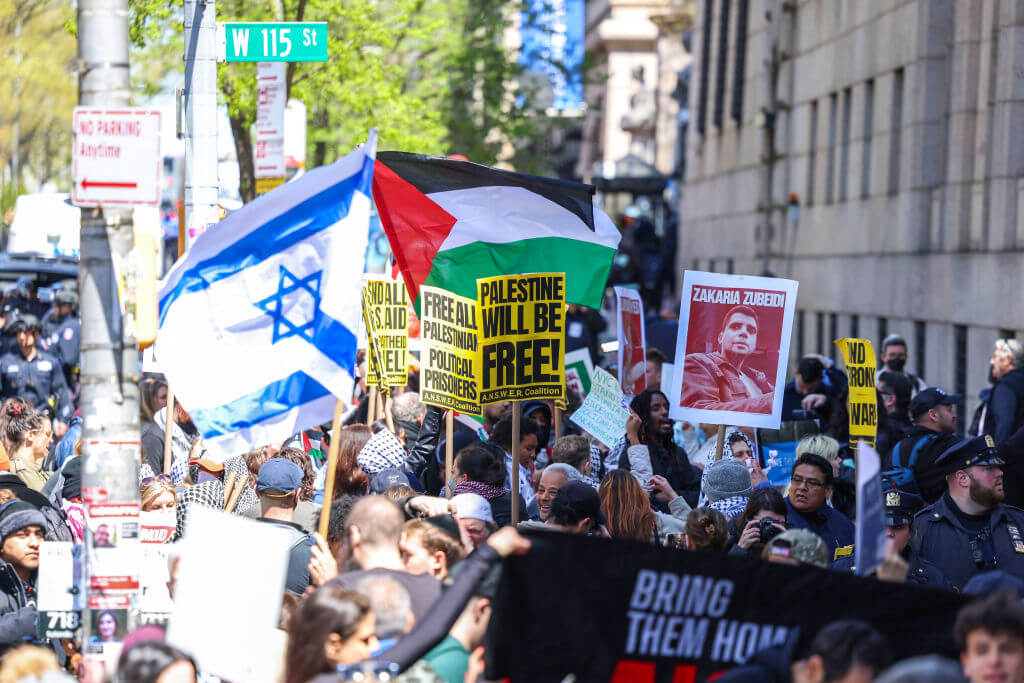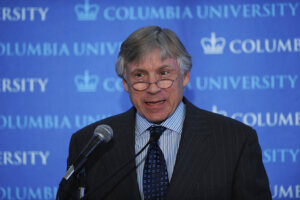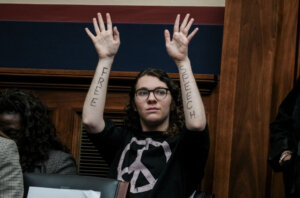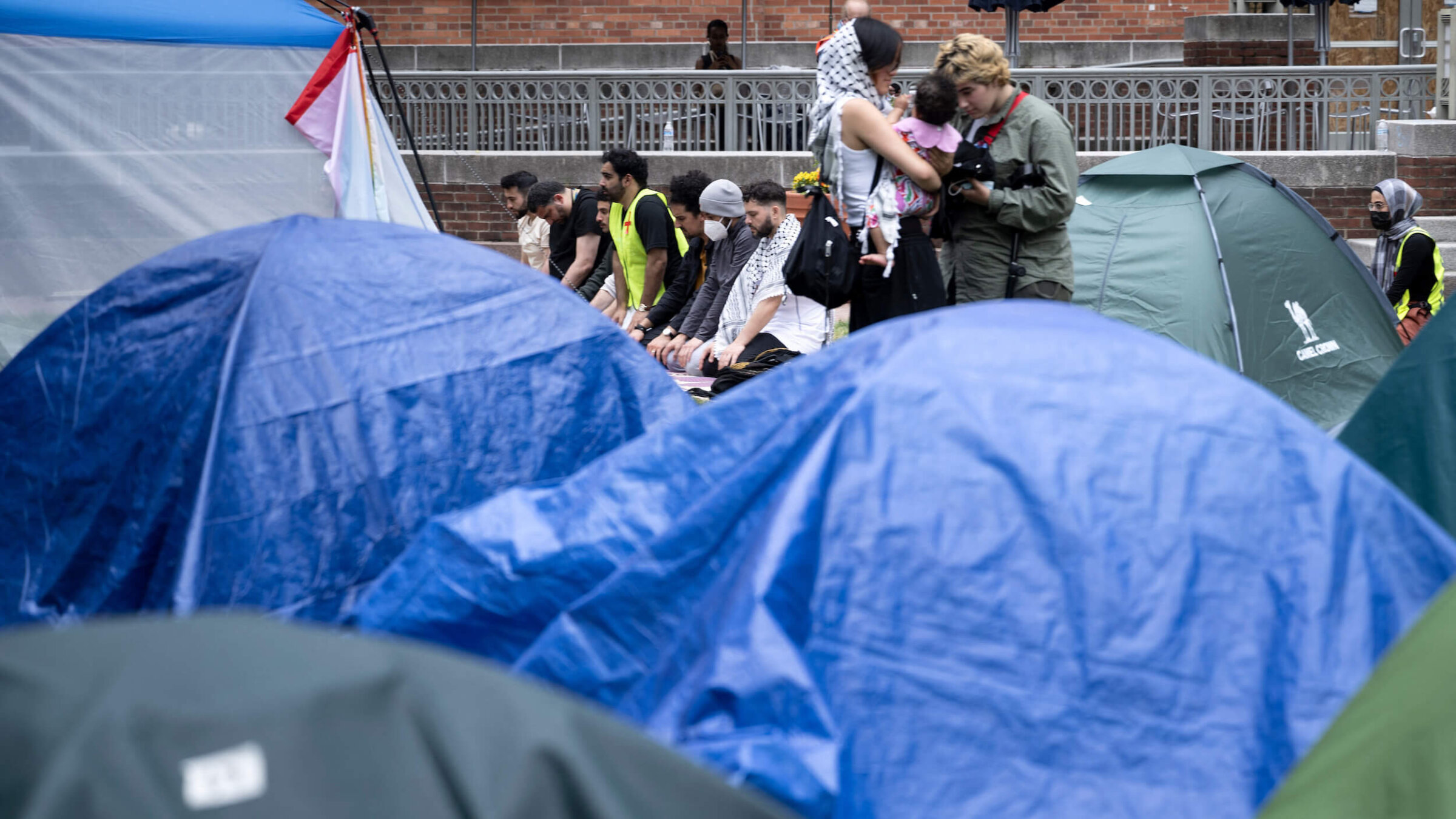Campus leaders should be more focused on educating their community’s on how to think, than what to think

Outside Columbia University’s gates last month.
By Jodi Rudoren
As my niece graduated from Syracuse University this month, her dad — my brother-in-law — shared a story from his time at Haverford College.
It was 1986, and one of the people slated to receive an honorary degree, Drew Lewis, had sparked controversy on campus because of his role in the Reagan administration breaking the air traffic controllers’ strike. Twenty-eight professors signed a letter of protest, and a few dozen students wore white armbands at commencement.
Lewis, after a speech defending his actions during the strike, startled the crowd by ripping off the ceremonial hood. He explained that he believed in the Quaker values that guided Haverford — he was Class of 1953 — including the goal of consensus. Since there was no consensus on him getting the degree, he declined it. The crowd roared in standing ovation.
At first I heard this as a story of courage, humility and a less-toxic political moment. But as it sank in, I began to see a cautionary tale for all that has gone so very wrong on American campuses this spring.
Colleges and universities should not yearn for consensus. They must be places of vigorous debate, dissent and diversity of thought. Where people can wear armbands and sign letters and give and get honorary degrees and none of it stops the essential functions of teaching and learning, which most of all requires open minds.
Lee C. Bollinger, the First Amendment scholar who was president of Columbia University from 2002 to 2023, often talked about this in his convocation speeches welcoming first-years to campus, many of which are collected in his new book, In Search of an Open Mind.
“I would always say, you have to understand: You’re in a place now where lots of things are going to upset you,” Bollinger told me, in his first interview since the campus protests exploded at Columbia and across the country.
“You have these young people who are having their first true academic experience of being open to all kinds of things they’d never thought about before, some of which are going to be upsetting and even offensive, and they’re trying to find their way through this to become a person who has certain values, certain beliefs,” he explained. “That’s often a tension.”

I reached out to Bollinger this week, as a third round of embattled university presidents was grilled on Capitol Hill about their handling of the protests and hate speech, for a couple of reasons.
He not only led Columbia through all manner of turmoil over 21 years, but before that spent six at the helm of the University of Michigan, where he successfully defended affirmative action at the Supreme Court. The son and grandson of newspapermen who grew up developing film and melting lead for linotypes, Bollinger does not just study free speech principles, he breathes them.
“Whenever you have people who strongly disagree, where people are saying outrageous things and very hurtful things and dangerous things, you really need to have a campaign to try to come to terms with that without using censorship,” he told me.
“It’s hard when people are angry and so passionate — and maybe wrong and misguided as well — to try to bring this to a better place,” Bollinger added. “But that is the true challenge of the First Amendment, or a democracy, or certainly a university.”
We met in Ann Arbor in 2001, when I was covering higher education for The New York Times and he was battling back challenges to Michigan’s push to diversify its student body. I described him then as an unpretentious Renaissance man who “easily mixes intellectual pronouncements with deadpan humor,” a runner of marathons, fan of Paul Simon, owner of a Labrador, driver of a Jeep.
Now 78, Bollinger is finishing up a sabbatical year at his summer home in Maine, and will be back at Columbia Law School teaching about the First Amendment this fall. He has not spoken out about the campus protests because he made a vow to himself long before Oct. 7 not to say anything that could be construed as critical of his successor for at least this first sabbatical year.
So I agreed not to ask about Columbia’s new president Minouche Shafik, who is under fire from all sides for her handling of the protests, in order to get his broader insights — especially about the role of the university president, over time and at this critical time.
For it seems to me that never have so many smart people bungled things as badly as university presidents have on Israel-Palestine this year. Watching their mealy-mouthed statements in the fall and overly aggressive crackdowns this spring, I’ve been disappointed by the lack of thought leadership and what seems like a tragic narrowing of the space for the truly difficult conversations that should be a hallmark of higher education.
And now, a staggering number of top schools — Yale, Harvard, U.Penn, Cornell, UCLA, Notre Dame, among others — are all on the hunt for new presidents, in some cases to replace folks forced to resign for mishandling this year’s madness.
I asked Bollinger what it takes to succeed in what he called “the greatest job in the world even though it’s among the most difficult.”
You have to come from within academia, he said, and understand its “very special culture and very distinct organizational characteristics.” You have to stay connected, by continuing to teach and do research. You cannot lose the faculty.
“A university is a bizarre organization,” Bollinger noted. “You would never in your wildest dreams design a university in the way a university is, and yet they are among if not the prime example of successful American institutions.
I gleaned another critical characteristic as he spoke — to retain some humility despite being the smartest person in most rooms. And: Take the long view.
“Right now universities are under the gun and they’re criticized,” he continued, “but the fact of the matter is, by any standard — student demand, contribution to the well-being of society, the creation of modern life — universities are among the most successful institutions in the United States. They are the envy of the world.”

Bollinger is an outlier, having spent more than two decades running Columbia. The average tenure these days is less than six years, according to a study by the American Council on Education, down from 8.5 in 2006. A century ago it was more like 10 or 14, and again Columbia was an outlier, with Nicholas Murray Butler running the place for an astonishing 43. (“The last two years he was blind and everybody assumes not really capable and yet he continued,” Bollinger said.)
Gen. Dwight D. Eisenhower was president of a university (also Columbia) before being elected president of the country. Bart Giamatti led one (Yale) before becoming commissioner of Major League Baseball. There have been a lot of labor lawyers, skilled at negotiations. Fundraising prowess is a huge qualification.
The job is at once like being a CEO of a complex corporation and a mayor of a small town. With the twist that most of the employees cannot be fired. (See above: You cannot lose the faculty.)
“If you want to change something in the university, you have to do more talking, more persuading, than I think any other job that I can imagine,” Bollinger said. “That sounds easy, but it’s not. And even when you do that, there’s going to be tension and criticism and debate.”
What about thought leadership? “There was always a question, and it’s now being debated, to what extent should university presidents be a voice in the world on public issues,” Bollinger said. “I felt very strongly that while not a voice on every single issue, certainly on a range of issues that are in my area of expertise — free speech, democracy, affirmative action.”
That’s what has been lacking this year. University presidencies should be a bully pulpit, one free of the base politics of, well, electoral politics. I don’t want these people to tell us what to think on the Israel-Hamas war, but I would love their take on how to think about it and other contentious topics of the day without tearing people apart.
And their students really need to hear more from them on all manner of things. How their endowments are invested. Why they chose who they chose to receive honorary degrees. Where they see the boundary between one person’s protest and another’s education. Perhaps a primer on the profound difference between being unsafe and feeling uncomfortable.
But it only works if the president cares more about the core values of the university — academic freedom, diversity of thought, tolerance of vigorous dissent and offensive speech — than about consensus.
Jodi Rudoren has been editor-in-chief of the Forward since 2019. She previously spent 21 years at The New York Times, including a stint as Jerusalem bureau chief. Twitter: @rudoren. Email: rudoren@forward.com.
Biden needs to focus less on Israel to win young people’s votes

Student protesters are upset about the war in Gaza — but that’s far from their only motivating concern. Photo by Brendan Smialowski/AFP/Getty Images
Tamar Manasseh
CHICAGO — When I visited the pro-Palestinian encampment at the University of Illinois campus in downtown Chicago last week, I was at first surprised to see young women passing out fliers about reproductive rights. I encountered people of all ages and stripes, including those who usually make the news for being victims of perpetrators of gun violence.
Of course there were protesters wrapped in kaffiyehs and waving, wearing or otherwise displaying Palestinian flags, but there was also a gentleman who asked me, “Where the hell is even Pakistan,” apparently confusing two distant places that start with a P.
Everyone is out there for their own reasons, and they’re not all about Israel. Young people are being impacted by the same forces that are impacting all Americans everyday. Many are showing up at these protests hoping that their issue might get a sliver of the attention that the Gaza war is getting.
I, too, had my own reason for going. Since Oct. 7, I’ve been desperately trying to avoid talking about Israel and the war in Gaza, because I’m afraid of offending either my Jewish or my Black communities. But as the war has come to occupy an increasingly large space in everyone’s life, it became impossible to keep my head down, as friends and colleagues in both communities look to me to explain what is going on in the other.
So I went to see for myself what was happening inside one of the pro-Palestinian encampments that have dominated the headlines for weeks. What I saw and heard shocked me, and not for the reasons one might think.
I saw many protesters who clearly cared deeply about the conflict in Gaza and knew its details, explaining to anyone who would listen about what they were doing and why. But the more people I spoke to, the more things became apparent that are often hidden beneath the chants and the tents.
OPINION Which elite university figured out how to handle anti-Israel protests? Hint: It’s in Israel
This is not a news flash, but it is entirely true that not all of the protesters are students. And, as evidenced by the young man who did not even realize that it was Palestine and not Pakistan that he was ostensibly there to support, it became clear to me that many of the protesters aren’t even protesters at all. They’re simply Americans who believe that their concerns aren’t being heard by either party and who are attempting to get the attention of someone. Of anyone.
I saw people there who are food insecure and unhoused. A few told me they came to the encampment because there was free food and tents.
Most of the people I spoke with are not anti-Israel or pro-Palestine. They are anti-establishment. They don’t hate Jews. They hate Joe Biden and an administration that time and again has proven its ironclad commitment to Israel’s well-being while repeatedly failing to show that same level of support to issues that affect marginalized groups here like climate change, inflation, and gun violence.
This is the part that worries me most. At a time when the Biden administration should be focusing on the bread and butter issues to show Americans how it has helped them, it is spending too much energy on how best to prove its fealty to Israel.
This is a mistake. And neither Jews nor non-Jewish Black people can afford to let it happen.
Before I visited the encampment, I was talking with a young Black man who is not Jewish, and who is no expert in geopolitical disputes. When I mentioned the rise in antisemitism since Oct. 7, he stopped me and said: “America loves Jews more than it cares about us. No other group gets the same kind of attention that Israel and the Jewish people do from our government.”
He likened Jews to a favorite child, the one who always gets special treatment. As a parent, child, and a sibling myself, this makes a lot of sense to me. At different times, we all believe our parents may be favoring one of our siblings over us, and have no clue that our siblings are thinking the same.
In the best-case scenario, the kids all love each other deeply but harbor some resentment toward their parents for perceived favoritism. In the worst, however, the favorite son becomes like the biblical Joseph with his colorful coat.
In ancient times, Joseph’s brothers threw him into a pit and sold him off into slavery. Today, Joseph is simply canceled, ostracized on social media and protested against on college campuses.
I’m convinced that most of the protesters aren’t out there because they hate their siblings — or Jews, or even Israel. They’re doing it because in comparison to the support their government is giving the Jewish state, it’s become glaringly obvious how little it seems to support them.
Even if the war ended today, it would not change the fact that many young Americans and people from marginalized groups feel less protected by their country than they did before Biden and his team showed them what real, actual support looks like.
People are out there on campuses and in the streets around them because there is something profoundly broken in our country.
It’s far beyond time for Washington to begin spending the money we claim not to have on mental health services, education and improving the lives of Americans in need, in short, on creating peace at home. Maybe if we did so, there wouldn’t be so many people demanding radical change abroad.
OPINION The campus protests are no longer about Israel. They’re about America.
Tamar Manasseh is the founder and president of Mothers Against Senseless Killings. Follow her on X, @TamarManasseh.
The views and opinions expressed in this article are the author’s own and do not necessarily reflect those of the Forward. Discover more perspectives in Opinion. To contact Opinion authors, email opinion@forward.com
At the Forward, our Vision and Mission articulate the change we want to see in the world, and how we can help make it happen. Our Values describe the essential pieces of who we are and how we operate. After 120+ years spent serving the Jewish community, and with our new global reach and purely digital focus, there are a lot of stakeholders who rightfully feel a deep connection to the Forward and what we do. The articulation of our Vision, Mission, and Values is informed by that history and those relationships.
Vision
The Forward envisions a vibrant, connected global Jewish community informed by our shared history and committed to justice, compassion, truth and our collective responsibility to bridge our divides.
Mission
The Forward is the most significant Jewish voice in American journalism. Our outstanding reporting on cultural, social and political issues inspires readers of all ages and animates conversation across generations and different segments of our community. Our English and Yiddish platforms build on a century-old legacy maintained in our archives and lead to a deeper understanding of what it means to be Jewish in the 21st century.
Values
Integrity: We provide fair and full reporting in the highest tradition of public-service journalism, a cornerstone of resilient democracy. Through our work, we help build the foundation for a just, open, pluralistic society.
No comments:
Post a Comment